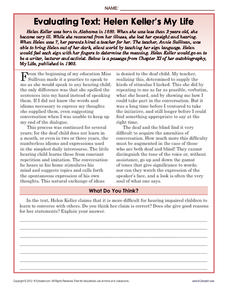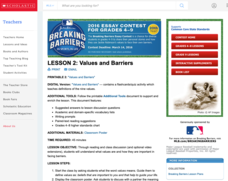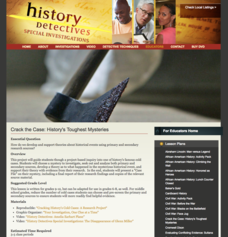EngageNY
Advantages and Disadvantages of Various Mediums: The Montgomery Bus Boycott Speech
Text, speech, phone call. Scholars discuss the advantages and disadvantages of using speech and written text to express ideas. They use an Analyzing Mediums graphic organizer to analyze speeches by Martin Luther King Jr. They then...
PBS
Who Knows Best
Finding an expert in a given field when conducting research can be a challenge. This guide provides step-by-step directions as well as links to resources that help young sleuths find the authorities and experts they need. As a bonus, two...
K12 Reader
Limited Resources
Here's a comprehension exercise that asks readers to include direct quotes in their analysis of an article on ways to conserve natural resources.
iCivics
Drafting Board: Interest Groups
Does the influence of interest groups harm a political system? Your class members will analyze the role of interest groups in American politics, as well as consider the effect of perspective, bias, loyalty, and the First Amendment.
EngageNY
Launching the Performance Task
This word or that, this picture or that. Individuals dive into the lives of The Little Rock Nine and the connotation used in the book A Mighty Long Way as they begin the performance task. The task scenario establishes literature lovers...
Curated OER
SOAPS Primary Source "Think" Sheet
Planning on using primary source materials? Introduce your class members to SOAPS, a worksheet that models how to analyze and reflect on primary source materials. Readers name the document, identify the subject (S), the occasion (O),...
Pearson
Making Inferences
The ability to make inferences is an important skill. Provide your class with some practice. This resource includes several different passages with which learners are required to practice inferring. They read each passage and respond to...
Curated OER
Unit 3: Scientific Writing
Write-on! Demonstrate a writing model and support learners as they write an informational essay on a water resource issue of your (or their) choosing. The lesson plan provides a well-scaffolded summative writing experience that wraps up...
University of Pennsylvania
Mock Trial of Alfred Dreyfus
What if scholars based mock trials on history? The fourth installment of a five-part series on the Dreyfus Affair asks learners to read various pieces of evidence before conducting a mock trial for a French officer. Teams answer...
K12 Reader
What's the Forecast?
Rain gauges, thermometers, and wind vanes. After reading a short article about weather forecasting, readers identify the tools meteorologists use to predict the weather.
Read Works
The Age of Exploration
Christopher Columbus did not have a lot of evidence to prove that he was in India, but language arts pupils have plenty of evidence to prove that he wasn't. Delve into the world of European exploration with a reading activity about...
EngageNY
Analyzing a Thematic Concept: The Invisibility of Captives during WWII (Pages 182-188)
Readers complete a word web-based on the word dignity. They use their Understanding Invisibility note catcher to discuss how dignity relates to the theme of invisibility. After group discussion comparing invisibility and loss of dignity,...
EngageNY
Introducing a Thematic Concept in This Unit: The “Invisibility” of Captives during WWII (pages 170-181)
Scholars discuss the phrase identity is erased and how it relates to the theme of invisibility. They use their Understanding Invisibility note catcher to identify how invisibility may occur within a person. They then work on a Gathering...
Curated OER
ELA Unit Planning Template Style One
Work with your department or on your own to create organized unit plans that connect to all parts of the Common Core standards. The three-page template includes space to summarize the unit, list standards for each category of the ELA...
K12 Reader
Evaluating Text: Helen Keller's "My Life"
Readers are asked to evaluate Helen Keller's claim, and the evidence she uses to support her argument, that it is more difficult for hearing impaired children to learn to talk with others.
Channel Islands Film
Island Rotation: Lesson Plan 1
How do scientists provide evidence to support the theories they put forth? What clues do they put together to create these theories? After watching West of the West's documentary Island Rotation class members engage in a series of...
EngageNY
End of Unit 2 Assessment, Part One: First Draft of Analysis Essay
How do writers use evidence from literary texts to support analysis and reflection? With instructional activity 17 of 20 from the Grade 8 ELA Module 1, Unit 2 series, learners gather resources to prepare for an end-of-unit assessment....
EngageNY
The Authorship of Shakespeare: “The Shakespeare Shakedown”
Pupils conduct a close reading of "The Shakespeare Shakedown" by Simon Schama, and identify evidence the author uses to support his claims. Finally, they discuss and answer text-dependent questions before completing a Quick Write about...
EngageNY
Making a Claim and Advocating Persuasively: Preparing for the Practice Fishbowl
Scholars consider their reading in The Omnivore's Dilemma to develop a claim answering the question, "Which food chain would you choose to feed your family—the local sustainable food chain or the hunter-gatherer food chain?" To guide...
Newseum
Civil Rights: Turning Points
As part of a civil rights movement study, groups select an event from an interactive timeline that they feel marks a turning point in the struggle. After collecting evidence to support their choice, the teams develop a multimedia...
Curated OER
Don't Believe the Hype
Are hand sanitizers good for you? What about the environment? Research the science behind commonly used cold medicines. The class reads an article, creates a product poster, and conducts independent research on product claims made by...
Scholastic
Lesson 2: Values and Barriers
Scholars investigate and discuss the importance of values and how they can be used to break barriers. Small groups work collaboratively to examine the text and draw inferences to answer questions. A writing assignment challenges pupils...
PBS
Crack the Case: History's Toughest Mysteries
Young sleuths don their trench coats, tip their fedoras, and grab their notepads to investigate one of four famous unsolved mysteries. After examining multiple primary and secondary sources related to their cold case, they propose a...
Jamestown-Yorktown Foundation
Making a Patriot Inquiry: Are Independence, Freedom, and Liberty the Same Thing?
As part of a study of the American Revolution, class members engage in an inquiry-based lesson that has them watch a scene from the play Slave Spy, examine multiple primary source documents, and then discuss the similarities and...

























